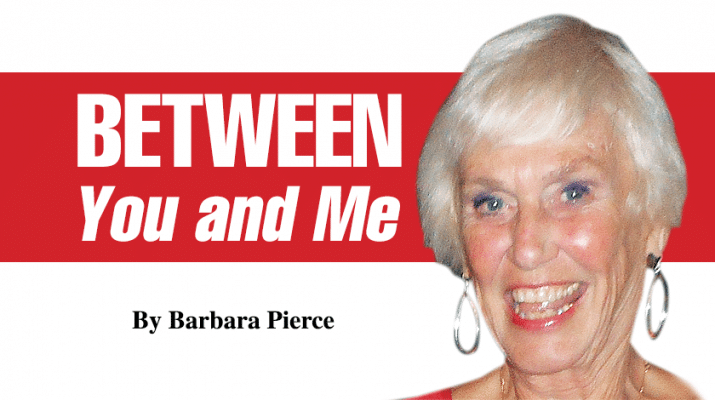By Barbara Pierce
There is no Prince Charming and no happily ever after.
Those fairy tales our mother read us when we were young got it all wrong. Cinderella doesn’t marry her prince and live happily ever after. Neither does Sleeping Beauty or Snow White.
It’s all a fairy tale; they sold us a fairy tale and led us to believe that’s how it works. Find your handsome prince and live happily ever after.
What is true is that the handsome fascinating Prince Charming becomes a pot-bellied guy picking his nose and scratching his bald head.
And Cinderella’s unappealing wearing her ragged old robe and blowing her nose into a ratty Kleenex.
That’s because we’re human.
We fall in love, “passionate love.” Dopamine and other chemicals in our brain create those feelings of euphoria. Those feelings last only about 12 to 18 months, according to experts.
After that, for the couple to remain attached to each other, they need to develop a different sort of love. That’s the way it works. It’s inevitable that we will lose that intense feeling of passionate romance.
What a great feeling that is and how sad that it won’t last. And how sad that nobody tells you that so you can prepare.
When the passion fades, there comes a choice: We can transition to a love that’s fed by a day-to-day appreciation of that person in the here and now, or we can end the relationship and go in search of another roller coaster ride. It’s not an easy transition.

It all comes down to dopamine, “the molecule of more,” as Daniel Lieberman and Michael Long explain in their new book: “The Molecule of More.”
“Our brains are programmed to crave the unexpected,” they say. “We get a dopamine rush from promising surprises. But when anything new, including love, becomes familiar, the excitement slips away and so does the dopamine rush.
“Dopamine is the chemical of desire that always asks for more — more stuff, more stimulation, and more surprises. From dopamine’s point of view, having things is uninteresting. It’s only getting things that matters — It’s the anticipation module,” they say.
By accident, I watched a mediocre older movie not long ago, “Someone Like You.” Ashley Judd’s character gets dumped; her boyfriend leaves her for another girl.
No fooling the ‘Old Cow’
She rationalizes that he left her because of the “Old Cow Theory.” This says that bulls refuse to copulate with a cow they have already mated with, even when researchers disguise the old cow with the scent of a new one.
Old cow theory suggests that all males will leave all females eventually because their biological imperative is to find the new cow.
I don’t know anything about cows. But whether that theory is right or wrong, we are more complicated than cows. Lieberman and Long say it’s dopamine that leads one to keep seeking out new partners.
I do know for a fact that love fades for most of us. That wonderful feeling of excitement in the rush of first love is real; scans show that our brains are flooded with feel-good chemicals. But then there is an inevitable change over time from passionate love to what experts call compassionate love — or love that is deep but not as euphoric as that experienced during the early stages of romance.
Harvard Medical School studied this phenomenon, which is online on its website called “Love and the Brain.” They have this to say:
“For those whose long-term marriage has transitioned from passionate, romantic love to a more compassionate, routine type of love, it is possible to rekindle the flame that characterized the relationship’s early days. We call it the ‘rustiness phenomenon.’ Couples get out of the habit of sex, of being incredibly in love, and often for good reasons: work, children, a sick parent. But that type of love can be reignited. Sexual activity, for example, can increase oxytocin levels and activate the brain’s reward circuit, making couples desire each other more.”
That alone may be enough to bring some couples back to those earlier, exhilarating days, when all they could think about was their newfound love, the writers said.
Yes, sexual activity.
I guess fairy tales have their purpose for young children, but I think more needs to be said to young people to make them aware that passionate love doesn’t last. By its very nature, it burns itself out. And they need to be prepared for when that happens.
• Barbara Pierce is a retired licensed clinical social worker with many years of experience helping people. If you would like to purchase a copy of her book, “When You Come to the Edge: Aging” or if you have questions for her, contact her at barbarapierce06@yahoo.com.

